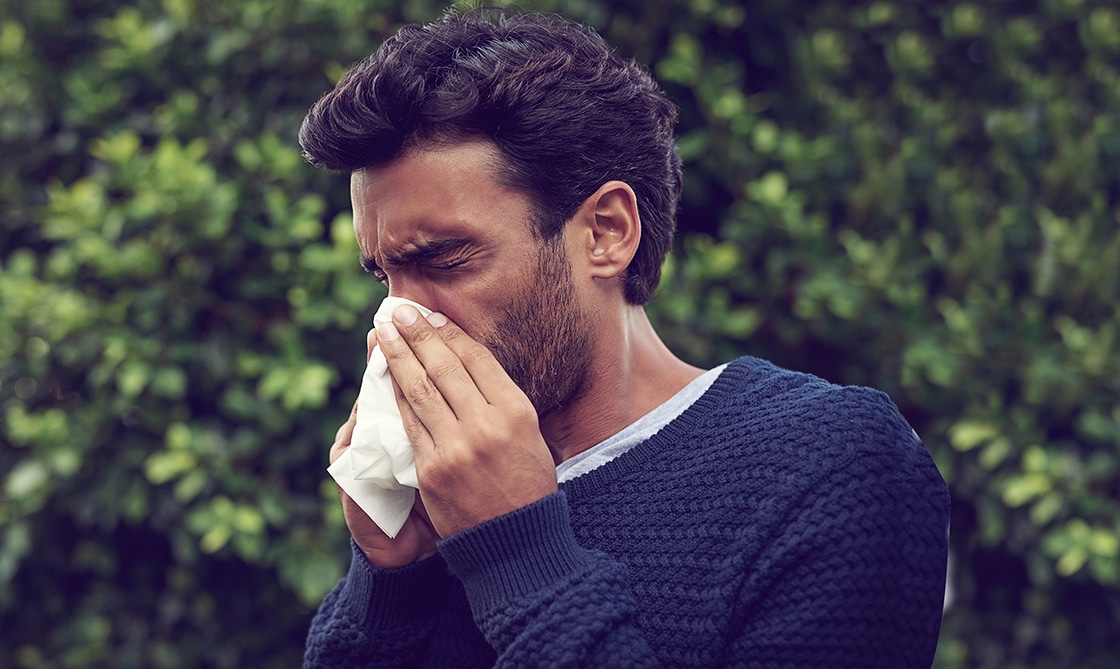
Sinus and Allergy Treatments
If you suffer from hay fever, it means your immune system is sensitive to certain things, called allergens. Nyal has an extensive range of nasal and sinus products to help you with your symptoms today.
Sinus congestion
What is sinus congestion? Sinus congestion occurs when you get inflammation in your sinuses, which are the hollow spaces in the bones of your face. It usually happens after you’ve had colds and flu. Unfortunately, for anyone who develops sinus congestion, symptoms generally get worse over a period of five days, and can stick around for ten days or more.
What are these symptoms? Well, sinus congestion symptoms are mostly related to inflammation and can include:
• Feeling like your face is full (known as facial congestion) or in pain
• Sensation of pressure that gets worse when you lean forward
• A runny nose
• Loss of sense of smell or taste
• Bad breath and/or a bad taste in your mouth
• Sore throat and/or cough
• Tiredness
• A high temperature or getting the shivers (fever)
• Headache
• Toothache
The key to relief from the symptoms of sinus congestion is to reduce the swelling of the blood vessels and tissues in your sinuses. This can help relieve pain. Things you can do at home for you or your family include:
– Inhaling steam from a bowl of hot water with a towel over your head
– Staying well hydrated by drinking plenty of water
– Gently blowing your nose one nostril at a time
– Placing a warm or cool cloth, whichever helps, over the aching area
– Resting and avoiding heavy activity until symptoms go away
– Keeping the room at a comfortable temperature
Hayfever and Allergies
Sneezing, an itchy, runny nose and itchy, watery eyes are the classic calling cards of hayfever, also known as allergic rhinitis. If you are unlucky enough to be living with hayfever, it means your immune system is sensitive to allergens. Allergens such as dust mites, mould, fungal spores, animal fur or air pollutants can be present all year round. Other allergens may be around during certain seasons, like pollens and grass in the air during spring and summer. Make sure you’re prepared for allergy season next time you go to the grocery store and grab some of the Nyal range of nasal and sinus products for your medicine cabinet.
Managing the symptoms of hayfever can mostly be managed at home by:
– Minimising your exposure to allergens
– Rinsing out your nose with salt water or saline
– Some people find relief from using hayfever treatments like antihistamines, decongestant sprays and decongestant tablets
Take good care with Nyal
In order to help your whole family find relief from the symptoms of sinus congestion and hayfever, Nyal has developed a range of nasal and sinus products.
For family members from newborn and upwards, Nyal Gentle Relief Saline Nasal Spray gently and naturally clears congestion. It can help with clearing blocked noses and washing away allergens, dust, and pollen, and is gentle enough for everyday use.
For relief of nasal congestion due to colds or flu, allergy, hayfever and blocked sinuses, try Nyal Decongestant Nasal Spray or Nyal Nasal Decongestant tablets which contains the decongestant phenylephrine to help relieve the symptoms of sinus congestion.
FAQs
Common signs of sinus congestion include facial congestion, pain and a runny nose.
You can help find relief from sinus congestion with the Nyal range of nasal and sinus products. Always see your doctor for advice or if you are concerned.
Lots of things can trigger hayfever, some common allergens are grass, weeds and tree pollen, dust mites and dust, animal fur, moulds and fungal spores and air pollutants.
Hayfever can make you sneeze, have an itchy, runny nose, and itchy, watery eyes. It can even affect your sleep and daily activities such as work, school, sport and leisure.
With a lot of similar symptoms, it can be a little tricky to tell the difference between hayfever and a cold. The trick to recognising hayfever is the presence of an itchy nose and itchy, watery eyes.
AU-2021-07-0059